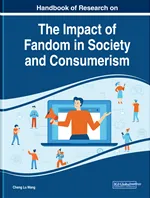 Dr. Nathalie Collins (Edith Cowan University, Australia)
Dr. Nathalie Collins (Edith Cowan University, Australia)With so many commercial elements collecting cult followings and connections deepening between fans and specific characters and franchises, it has become essential for marketing and consumer experts to understand the customers they are enticing. From utilizing proper terminology for each fandom and fan to marketing new products directly to the individuals that want them most, it takes a wealth of knowledge to fully connect with a fandom consumer base. To better understand these customers, Dr. Nathalie Collins, from Edith Cowan University, Australia, shares the latest research on this topic from her chapter “Who's Who: Setting a Standard Nomenclature Using a Fan Folksonomy” co-authored by Mr. Jeff Volkheimer from Duke Health, USA and Prof. Jamie Murphy University of Eastern Finland, Finland from the Handbook of Research on the Impact of Fandom in Society and Consumerism, edited by Prof. Cheng Lu Wang from University of New Haven, USA in the IGI Global interview below.
What inspired you to pursue research activities on fan communities?
Many researchers are drawn to issues important to them. I am no exception. I felt passionate about brands and consumer experiences, and I wanted to know why. Mr. Jeff Volkheimer, on the other hand, is more measured, and presents a good foil to my passion for the subject. His distance and his lack of ability to get swept away into consumer culture gives him a more critical lens that tempers my enthusiasm. Prof. Jamie Murphy is a seasoned academic and researcher who is a spirited and critical voice in – well, pretty much everything, but marketing in particular.
Why are your respective areas of research important to the field at large?
Producers (commercial, government, political, and otherwise) are seeking emotional connections with their audiences because emotions motivate people to action. Whether it is spreading word of mouth, creating digital user content, repeat purchasing, or maintaining the mythic lore of a product, consumers do a lot of heavy lifting with products, and they do it for free. When consumers have access to communication channels, they can do even more. Finally, consumers are seen as the unpaid workforce they are. However, to effectively leverage their efforts, their connection to the product, brand, or idea has to be genuine on some level. This is because the power of any messaging is diluted when it is seen as inauthentic. So, the challenge for us as individuals in a social context is: how do we create an environment where people like us? And the challenge for companies are the same.
In your opinion, what are some of the benefits of your research to its community of users?
This particular taxonomy is important because so much has already been written about fan communities. And although some phrases come up over and over and mean roughly the same thing (“geek,” for example) they don’t mean exactly the same thing. By standardizing language, we not only can ensure that we are talking about the same thing, but we can also uncover the richness that a Folk Taxonomy gives us. This book chapter was not only about segmenting fans, but their behavior and standardizing the way we talk about them. It was also about saying what it is about the names that certain segments have that tell about their history, and the kind of behavior we expect from them.
What are the future directions of your research areas?
Jeff and I explore authentic emotional connections in workplaces. We recently published an article in The Conversation about Baby Yoda and Disney’s co-opting of the Star Wars franchise. The “memefication” of Baby Yoda is one way that fans amplify the clout of a brand. What’s interesting about Baby Yoda and somewhat emblematic of our postmodern age, is that so many of the memes were not about the product, or Disney, at all. They were just about our attachment to Yoda as a character and what he represents, an archetype that goes back centuries.
We will continue to explore emotional attachment in commercial spaces, including workplaces, and how they can be leveraged transparently, ethically and for mutual benefit.
What are some other evolving research trends you have observed in your field over the past several months and what would you say are some of the innovative research directions you foresee in the future? How do you feel your publication sets the pace for these innovations?
Our book chapter is evergreen – it applies across industries, products, brands, even ideas that sweep through cultures at various times. There has been a lot of work done in consumer culture and that body of work continues to grow from both the socio-cultural and psychological perspective. As the qualitative research continues to grow based on the work of Belk, Kozinets, and other greats, the industry continues to look
too strongly at quantitative data, especially in the digital age. The lure of predictive analytics and AI is strong, but, like The Force, the hands it rests in are important. Are we considering the context enough? Are companies valuing culture and context enough? Are we respecting people as cultural actors? Are we reaching for authenticity appropriately? The chasm between marketers who understand culture and human behavior and the behavior of our colleagues in industry is often as far apart as ever. This is one of the reasons why Jeff and I are a good team. Both academics on this book chapter have significant industry experience, and we are partnered with someone who is 100 percent industry and runs a critical eye over everything.
What has your experience been like publishing with IGI Global?
I found that IGI Global has been able to give us, as researchers, a lot of control over our area of expertise. I think this is also because Prof. Wang is a great editor.

Available in print and electronic format, Handbook of Research on the Impact of Fandom in Society and Consumerism can be ordered with an automatic 20% discount off the list price when purchasing the publication directly through IGI Global’s Online Bookstore. Additionally, this publication is available across preferred providers such as GOBI Library Solutions, EBSCOHost, Oasis, and Ebook Central (Note: The automatic 20% discount is only available through IGI Global’s Online Bookstore), as well as IGI Global’s InfoSci-Books (5,300+ e-books) database.
Visit the publication’s webpage to order, or contact Customer Service at cust@igi-global.com or 717-533-8845 ext. 100 with questions. For researchers, be sure to recommend this publication or the InfoSci-Books database to your library to have access to this critical content.
IGI Global would like to thank Dr. Nathalie Collins for sharing her research on fandoms and consumerism. For more information about this research, view the publication here.
About Dr. Nathalie Collins: She is the Academic Director (National Programs) at Edith Cowan University in Australia. Dr. Collins has worked as a practitioner in marketing, customer experience, and business development roles. She is active in the project management and cybersecurity industries, as she has a role in delivering those courses in Melbourne and Sydney. Her primary areas of research are authenticity in commercial spaces, consumer religiosity, and word of mouth marketing. Find out more about Nathalie on theinfinitegame.org.
For your reference, find below a sample of related titles within business and social sciences, which are also featured in IGI Global’s award-winning InfoSci-Books database and are available for purchase in print and electronic format. Be sure to recommend these titles to your librarian, to ensure your institution can acquire the most emerging research.
| | Multidisciplinary Perspectives on Media Fandom
Prof. Robert Andrew Dunn (East Tennessee State University, USA)
Copyright: © 2020 | Pages: 300 | ISBN: 9781799833239 | EISBN: 9781799833253
This publication is a pivotal reference source that provides vital research that reviews some of the most exigent facets of today’s fandom and highlights understudied cultures of fandom as well as emerging intricacies of established fandom. While promoting topics such as esports, influencer culture, and marketing trends, this publication explores both qualitative and quantitative approaches as well as the methods of social science and critical perspectives. This book is ideally designed for marketers, media strategists, brand managers, consumer behavior analysts, researchers, academics, and students. |
| |
|
| | Exploring the Rise of Fandom in Contemporary Consumer Culture
Prof. Cheng Lu Wang (University of New Haven, USA)
Copyright: © 2018 | Pages: 300 | ISBN: 9781522532200 | EISBN: 9781522532217
This scholarly publication is an innovative scholarly resource that offers an in-depth discussion on the soaring popularity of fan communities and how these followers serve a larger purpose in a consumer-driven society. Highlighting applicable topics that include brand loyalty, fan perceptions, social media, and virtual realities, this publication is ideal for business managers, academicians, students, professionals, and researchers that are interested in learning more about how fan behavior can impact the economic environment. |
| |
|
| | Optimizing Millennial Consumer Engagement With Mood Analysis
Prof. Sabyasachi Dasgupta (O.P. Jindal Global University, India) and Prof. Priya Grover (Symbiosis International (Deemed University), India)
Copyright: © 2018 | Pages: 343 | ISBN: 9781522539469 | EISBN: 9781522539476
This scholarly publication is a critical scholarly resource that explores how companies ensure brand sustainability through influencing the minds and moods of consumers to create an interactive customer experience. Featuring coverage on a broad range of topics such product presentation, brand fandom, social media, lifestyle products, and buying behavior, this book is geared towards marketers, business managers, business practitioners, international business strategists, academicians, consumer researchers, and upper-level graduate students attempting to understand consumer engagement through mood analysis. |
| |
|
Disclaimer: The opinions expressed in this article are the author’s own and do not reflect the views of IGI Global.
About IGI Global: Founded in 1988, IGI Global, an international academic publisher, is committed to producing the highest quality research (as an active full member of the Committee on Publication Ethics “COPE”) and ensuring the timely dissemination of innovative research findings through an expeditious and technologically advanced publishing processes. Through their commitment to supporting the research community ahead of profitability, and taking a chance on virtually untapped topic coverage, IGI Global has been able to collaborate with over 100,000+ researchers from some of the most prominent research institutions around the world to publish the most emerging, peer-reviewed research across 350+ topics in 11 subject areas including business, computer science, education, engineering, social sciences, and more. To learn more about IGI Global, click here.
Newsroom Contact
Caroline Campbell
Marketing Manager
ccampbell@igi-global.com
(717) 533-8845, ext. 144
www.igi-global.com/